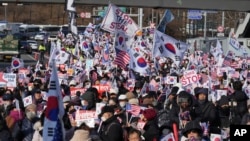South Korea’s political turmoil is deepening since its martial law debacle, and analysts say China may have an opportunity to increase its leverage over the country.
The current political chaos in Seoul is “working to[ward] Beijing’s advantage,” said Evans Revere, who served as the acting assistant secretary of state for East Asia and Pacific Affairs during the George W. Bush administration.
“China, with its authoritarian approach to governing, is beneficiary” and “no doubt pleased because China sees the ascendancy of the Democratic Party, known for its sympathetic approach to the PRC, as a positive development,” Revere said. China’s official name is the People’s Republic of China, or PRC.
South Korea is embroiled in a deep political crisis with impeachments of the country’s leaders last month. This week, a standoff with security forces outside the Seoul residence of President Yoon Suk Yeol prevented investigators from an anti-corruption agency from detaining him.
The main opposition Democratic Party, DP, urged the agency to make another attempt to detain Yoon after expressing regret over the withdrawal of the investigators.
The DP made two successive impeachments in two weeks last month. After impeaching Yoon on Dec. 14 over his failed attempt to impose martial law, the DP also succeeded in its push to impeach acting President Han Duk-soo the following week.
The fate of Yoon, who was suspended from his duties, rests in the Constitutional Court. If the court rules in favor of impeaching Yoon, the country will hold an election, and Lee Jae-myung, the head of the DP, is considered a strong candidate.
“China would welcome a DP government in Seoul since the new administration would be conciliatory toward Beijing and Pyongyang and more antagonistic toward Washington and Seoul,” said Bruce Klingner, a senior fellow of Northeast Asia at the Heritage Foundation.
“China could seek to drive wedges between South Korea and the U.S. by adopting a friendlier tone toward Seoul,” Klingner added.
Liu Pengyu, a spokesperson for the Chinese Embassy in Washington, told VOA on Tuesday that “China noted relevant events” but “will not comment on the ROK’s domestic affairs,” referring to South Korea by its official name, the Republic of Korea, or ROK.
Chinese Foreign Minister Wang Yi told his South Korean counterpart, Cho Tae-yul, in a Dec. 24 phone conversation that “China adheres to the principle of non-interference in internal affairs.” He said joint efforts on both sides have led to improved bilateral relations.
However, Klingner, in his report published just prior to South Korea’s general election last April, said China may find it beneficial to stir up resistance within South Korea to Yoon’s policies.
Beijing, using its United Front Work Department, “manipulates foreign public policy debates” by “intensifying political differences within target countries, and inflating public support for a politician or party,” the report says.
Leaning toward China
The DP is “very pro-China” and would “reorient the country toward China” if it takes the control of the government,” said Gordan Chang, distinguished senior fellow at the Gatestone Institute and the author of Plan Red: China’s Project to Destroy America.
“It’s clear how South Korea’s policies would change” as demonstrated by the DP’s attempt to have acting president Han approve the amendments to the Act on Testimony and Appraisal a few days after the opposition party voted to impeach Yoon on Dec. 14.
The amendment, sponsored by the DP, obligates individuals, including industry leaders, to attend hearings if asked and bans them from withholding information even if doing so would reveal trade secrets that might be sensitive to national security.
It would “force South Korean companies to divulge their trade secrets, which certainly would benefit China” and “certainly undermine South Korean businesses,” said Chang. “If South Korea loses its competitive edge, which is what the DP is trying to do, then it would be very easy for it to end South Korea’s democracy.”
A nonpartisan U.S. Congressional Research Service report released on Dec. 23 underscores that the DP “tends to advocate starkly different policies” than Yoon. The report also mentions that Lee has questioned Yoon for having “a greater willingness than prior ROK leaders to publicly criticize China’s actions.”
Yoon on Thursday said in a written message to his supporters rallying outside his residence that he will “fight until the end” against anti-state forces that put the country in “danger.” He thanked them for defending South Korea’s “liberal democracy and constitutional order.”
The message, reportedly delivered via a third person to his supporters, was signed by Yoon and made available to South Korean media by his lawyers.
Andrew Yeo, the SK-Korea Foundation Chair at the Brookings Institution’s Center for Asia Policy Studies, said, “The DP may recalibrate Seoul’s position between Beijing and Washington slightly and find itself more reluctant to support policies which are seen as red lines for China, such as supporting Taiwan in a Taiwan Strait crisis.”
He continued, “But the DP also recognizes the importance of the U.S.-ROK alliance, so I anticipate robust U.S.-ROK relations even under a DP government.”
Lee on Dec. 23 met with U.S. Ambassador to South Korea Philip Goldberg in Seoul and expressed hope for the alliance to develop further on human rights and environmental issues.
Goldberg also met with the ruling PPP.
Robert Rapson, who served as charge d’affaires and deputy chief of mission at the U.S. Embassy in Seoul from 2018 to 2021, said, “The U.S. will remain the priority relationship for the next Korean administration, regardless of whether it is progressive or conservative.”
He continued that a positive result that can emerge from closer South Korea and China relations “would be a greater cooperation from China in managing North Korea, especially if [President-elect Donald] Trump seeks to engage with [North Korean leader] Kim Jong Un.”
